Modern businesses face a critical challenge: managing voice operations to handle increasing customer expectations. Many traditional IVR systems fail to deliver seamless user experiences, leading to frustration and inefficiency.
Vapi addresses this gap by offering developers a cutting-edge Voice AI platform to build, test, and deploy AI-driven voice agents efficiently. Since its launch in 2023, Vapi has supported over 100,000 developers globally, powering millions of calls across the finance, healthcare, and travel sectors.
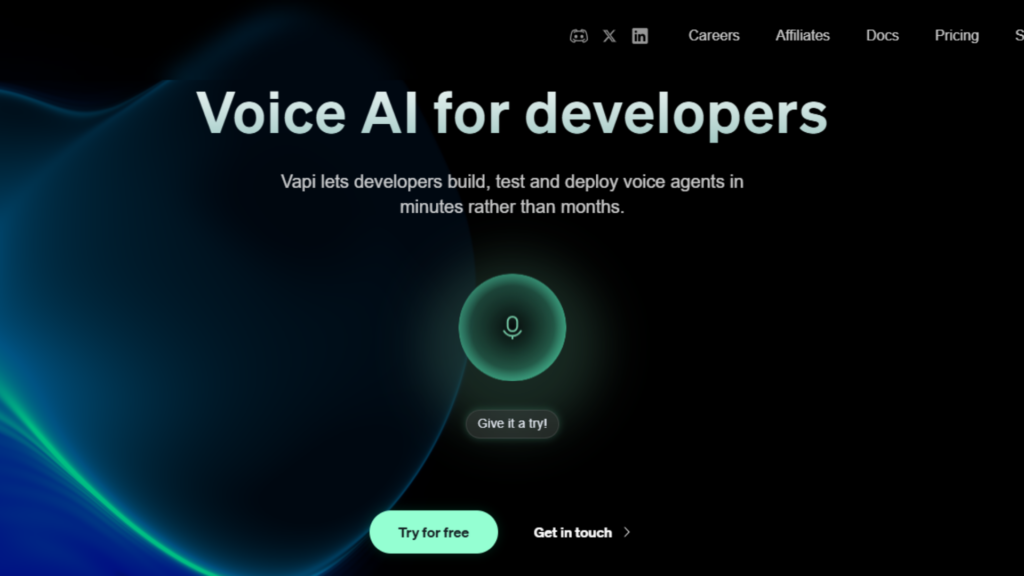
Its developer-focused APIs simplify custom conversation flows and integrate effortlessly with existing systems, cutting deployment times from months to minutes.
In this detailed review, I’ll explore Vapi’s standout features, practical applications, and performance in real-world scenarios. By the end, readers will clearly understand whether this platform aligns with their business needs and development goals.
What is Vapi?
Vapi is a Voice AI platform that simplifies the development and deployment of conversational voice agents. It provides developers with tools to create compelling voice solutions, helping businesses automate customer interactions efficiently.
Since its launch in 2023, Vapi has gained attention for its scalability and user-focused design, making it a practical choice across various industries.
Core Functionality and Purpose
Vapi offers developers tools to build, test, and deploy voice applications quickly. It enables businesses to handle customer support, appointment scheduling, and order management through natural and conversational voice interactions.
Unlike traditional systems, Vapi focuses on improving the customer experience by providing responsive and seamless interactions.
Key capabilities include:
- Voice AI Agents: Customizable agents can be built to suit specific business needs.
- Scalable Performance: Designed to handle large volumes of calls without interruptions.
- Integration Options: Compatible with existing telephony and business software systems.
- Testing Capabilities: Offers tools to evaluate and refine applications for optimal performance.
Target Users
Vapi is versatile and serves a wide range of users:
- Industries: It suits finance, healthcare, retail, travel, and e-commerce.
- Business Sizes: It supports businesses with varying needs, from startups to large organizations.
- User Roles: Developers, product managers, and IT teams benefit most from its features.
Unique Features and Benefits
What differentiates Vapi is its simplicity and flexibility, combined with features that cater to both technical and operational requirements.
Key advantages include:
- Fast Setup: Voice applications can be launched in significantly less time than conventional methods.
- Cost Efficiency: Automating repetitive tasks leads to savings in operational costs.
- Natural Interactions: AI-driven voice capabilities provide a more human-like experience for customers.
- Compatibility: Integrates easily with existing systems to support a smooth transition.
- Developer-Friendly Design: Clear documentation and user tools make it accessible for teams to work efficiently.
Vapi is a comprehensive solution for businesses looking to improve customer engagement and streamline voice communication processes.
Vapi Pros and Cons
Building on the earlier insights, here is an impartial evaluation of Vapi’s strengths and limitations.
Pros
- Developer-Friendly Features: With clear documentation and accessible APIs, Vapi simplifies the creation and customization of voice applications.
- Scalable Performance: The platform can manage large call volumes, making it a versatile choice for businesses of different sizes.
- Quick Implementation: Voice AI solutions can be set up and deployed faster than traditional systems.
- Easy Integration: The tool works smoothly with existing business and telephony systems, avoiding disruptions during adoption.
- Improved Interactions: The AI-driven conversational abilities create more natural and engaging user experiences.
Cons
- Technical Expertise Requirement: Non-technical teams may need extra resources or training to use the platform effectively.
- Fewer Ready-Made Templates: Due to the limited number of pre-configured solutions, businesses without a dedicated development team may find it less convenient.
- Clarity on Costs: Some users, especially those with variable usage needs, may find the pricing model less straightforward.
This balanced perspective clearly explains Vapi’s capabilities and challenges, helping users assess its suitability for their requirements.
Vapi Expert Opinion & Deep Dive
After examining Vapi’s features and comparing them to similar tools, it stands out as a practical solution for businesses and developers aiming to implement voice AI technology.
Its flexibility and scalability make it highly functional, but there are areas where improvement could expand its appeal further.
Standout Features
Vapi’s most substantial advantage lies in its focus on developer usability. The platform provides APIs that allow users to build and customize voice applications to meet specific requirements.
For example, a healthcare organization could use Vapi to set up automated appointment scheduling, ensuring accuracy and efficiency in patient interactions. Another highlight is the platform’s ability to handle high call volumes seamlessly.
This scalability is crucial for businesses experiencing seasonal demand spikes or rapid growth. An e-commerce company, for instance, could rely on Vapi during peak sales periods without worrying about interruptions or delays in customer interactions.
The integration capabilities also deserve mention. Vapi connects smoothly with existing business tools, such as CRMs and telephony systems, helping organizations maintain workflow continuity. This feature minimizes disruption during implementation and allows for immediate benefits from the platform.
Areas for Improvement
Despite its strengths, Vapi has a few limitations. The platform’s technical nature may pose challenges for users without dedicated development resources. Small teams or businesses without technical expertise may need additional support to utilize their capabilities thoroughly.
Another drawback is the lack of pre-configured templates. Some competitors offer a range of ready-made solutions, which can speed up deployment for common use cases like customer support or lead generation.
Vapi’s reliance on custom setups might slow the process for teams looking for immediate deployment. The pricing structure could also be clearer. Understanding costs can be tricky for businesses with fluctuating call volumes compared to platforms offering transparent, tiered pricing.
Best Fit vs. Less Suitable Users
Vapi is highly suitable for:
- Teams with Development Expertise: Developers and IT teams benefit most from the flexibility and customization options.
- Growing Businesses: Companies experiencing scaling demands or seasonal spikes can rely on Vapi’s infrastructure to handle fluctuating needs.
- Industries Requiring Precision: Sectors like healthcare or finance, where compliance and accuracy are critical, can customize the platform to meet specific standards.
It may be less ideal for:
- Small Teams Without Technical Support: These users may face challenges setting up and maintaining the platform.
- Businesses Needing Quick Start Solutions: Companies looking for out-of-the-box templates may find it less convenient.
Vapi offers significant advantages for users who value customization, scalability, and integration with existing systems. While it requires technical expertise to unlock its full potential, the investment can yield strong results for businesses prepared to implement it effectively.
Addressing areas like template availability and pricing clarity could make it an even more versatile option for a wider audience. Overall, Vapi remains a competitive choice in voice AI technology.
Vapi Key Features
With its comprehensive design and focus on user needs, Vapi provides a range of features that cater to developers and businesses looking to automate voice interactions effectively. Below is a detailed explanation of its key offerings.
1. Custom Voice AI Agents
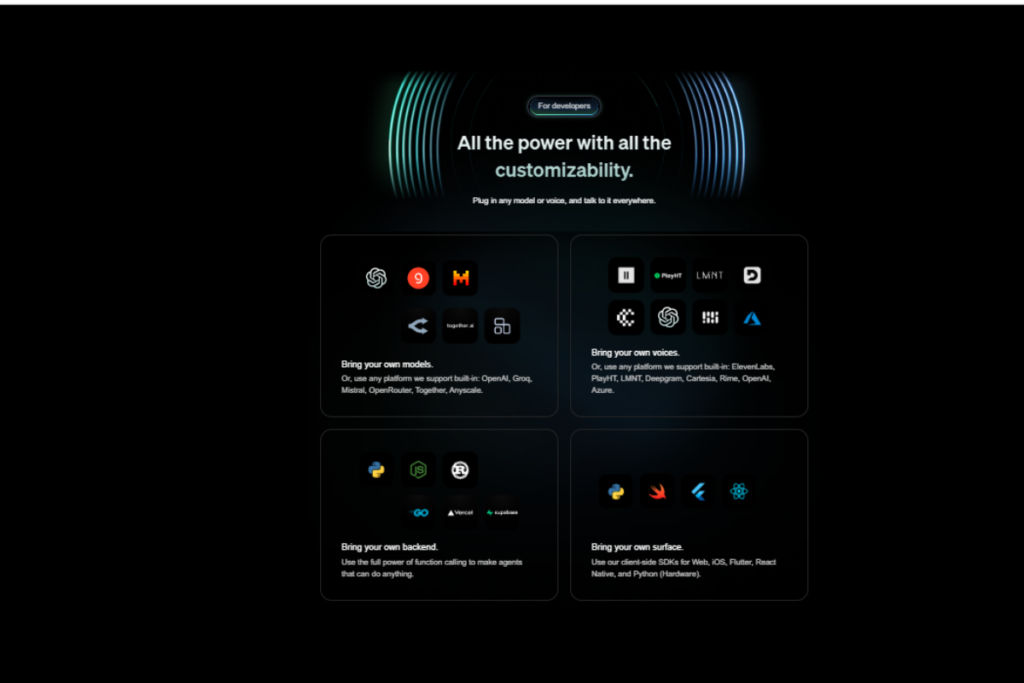
Vapi allows developers to create voice agents tailored to specific business requirements, such as handling customer queries or scheduling appointments.
By enabling detailed customization, businesses can deliver consistent and effective customer experiences and ensure workflows align with their operational goals.
2. Scalable Call Management
The platform can handle many call volumes, making it suitable for organizations of various sizes. This feature is especially valuable for businesses anticipating increased customer interactions during specific periods, such as product launches or seasonal demand.
3. Real-Time Testing
The ability to test applications directly on the platform simplifies the development process. Developers can identify and fix potential issues, leading to smoother deployment and reliable performance. This feature helps reduce delays and ensures the final application meets user expectations.
4. Integration with Existing Systems
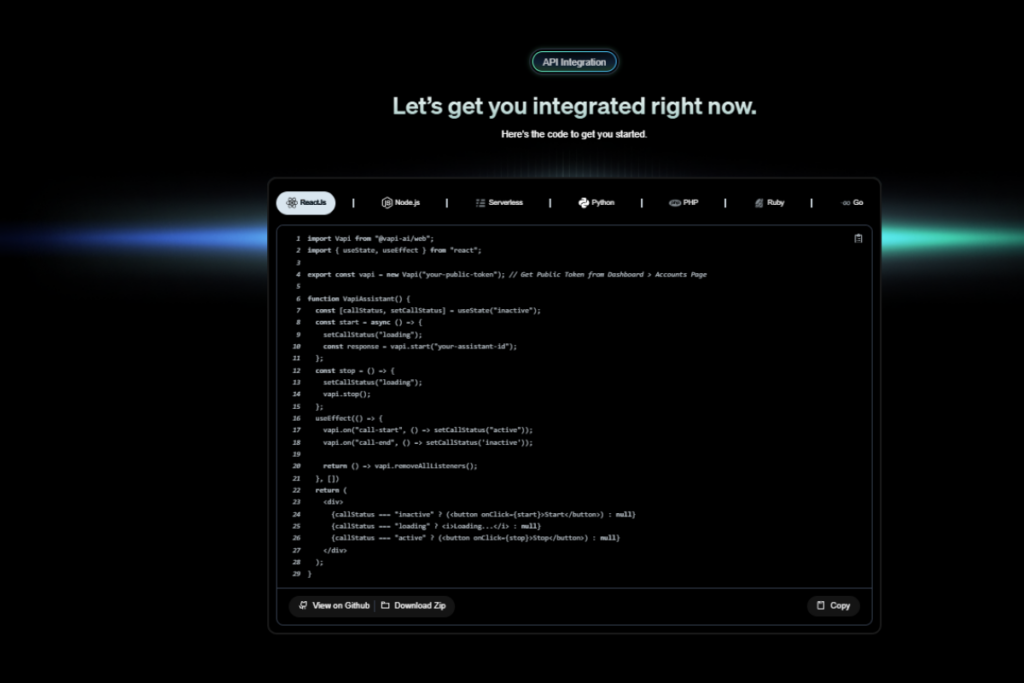
Vapi is designed to connect with business tools like CRMs and telephony systems, ensuring seamless operations. By synchronizing data across platforms, businesses can maintain consistency and efficiency in their processes without needing significant overhauls.
4. Advanced Natural Language Processing (NLP)
Vapi’s NLP capabilities enable voice agents to interpret and respond to customer inputs conversationally and intuitively. This enhances the overall user satisfaction and experience by making interactions feel more natural and engaging, regardless of the complexity of the query.
5. Support for Multiple Languages
The platform’s multilingual functionality makes it a valuable asset for organizations with a global customer base. This feature helps businesses maintain service quality across regions and linguistic groups, improving accessibility and inclusivity.
6. Analytics and Reporting
Vapi provides detailed insights into call performance, customer satisfaction, and operational metrics. These analytics help businesses identify trends, measure effectiveness, and make informed decisions to refine their voice applications over time.
7. Flexible Usage Plans
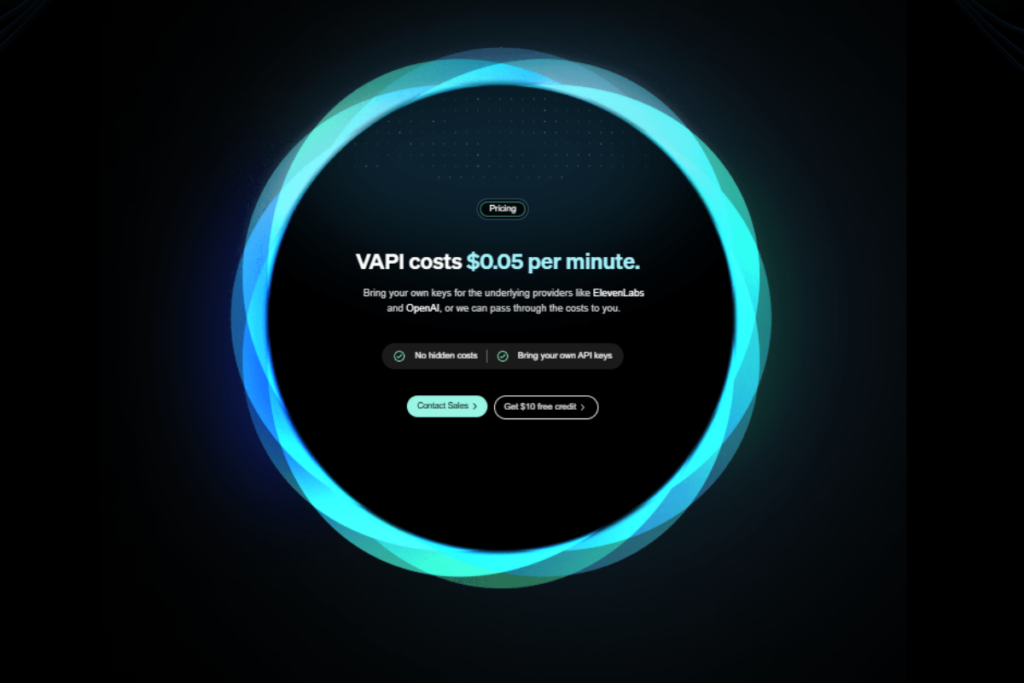
The platform offers pricing options that adapt to different usage levels. This flexibility lets organizations scale their operations gradually. It optimizes costs while effectively meeting their needs.
Vapi’s feature set makes it a reliable choice for businesses aiming to automate voice interactions and improve customer engagement while maintaining adaptability for future growth.
Vapi Pricing
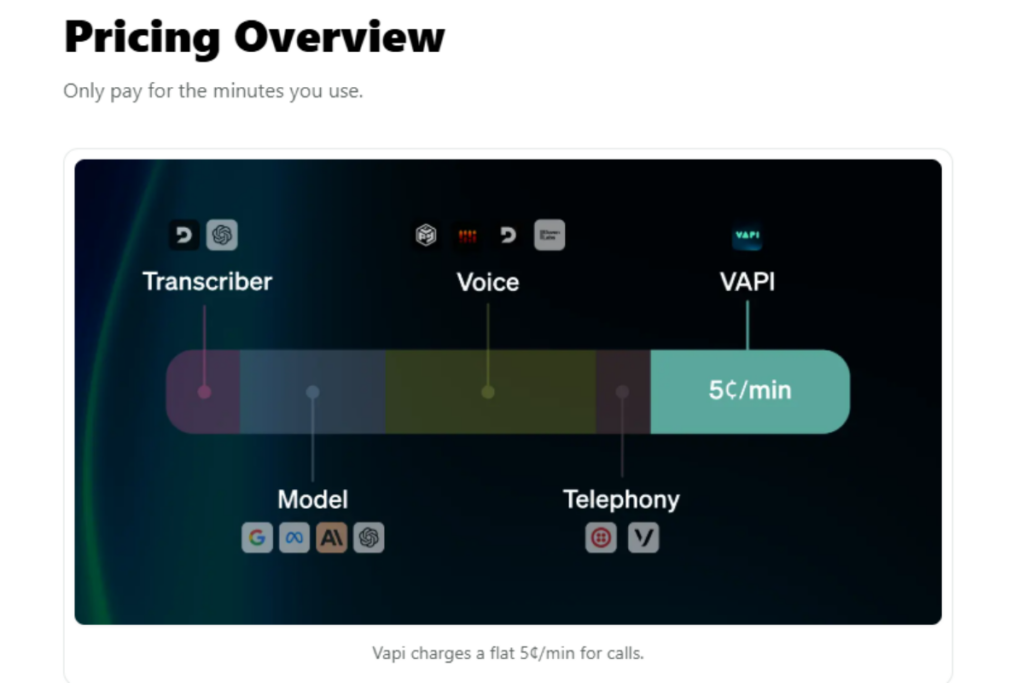
Vapi offers a clear pricing structure, providing flexibility for businesses of different sizes. Below is a detailed breakdown of its costs and features:
| Feature | Cost | Details |
|---|---|---|
| Call Charges | $0.05 per minute | Billing is prorated to the second. |
| Provider Costs | At-cost | Includes charges for transcriber, model, voice, and telephony services. |
| Bring Your Own Keys | Free | Users can integrate their API keys for providers, with Vapi managing the requests. |
| Phone Numbers | $2 per month | Each phone number purchased through Vapi is billed on a monthly basis. |
| Starter Credits | $10 free credits | New users receive credits to test the platform without entering payment details. |
| Enterprise Plan | Custom Pricing | Includes added features like 24/7 support, engineering calls, and volume discounts. |
Overview
- New User Access: The $10 starter credit allows new users to try the platform before making any financial commitment.
- Cost Efficiency: The per-minute pricing and second-based billing ensure users only pay for what they use.
- Custom Plans: Enterprise plans offer advanced features for businesses requiring higher limits and additional support.
- Potential Limitations: Smaller businesses or those with limited budgets may find the variable costs challenging to predict, particularly with at-cost provider fees.
Vapi Use Cases
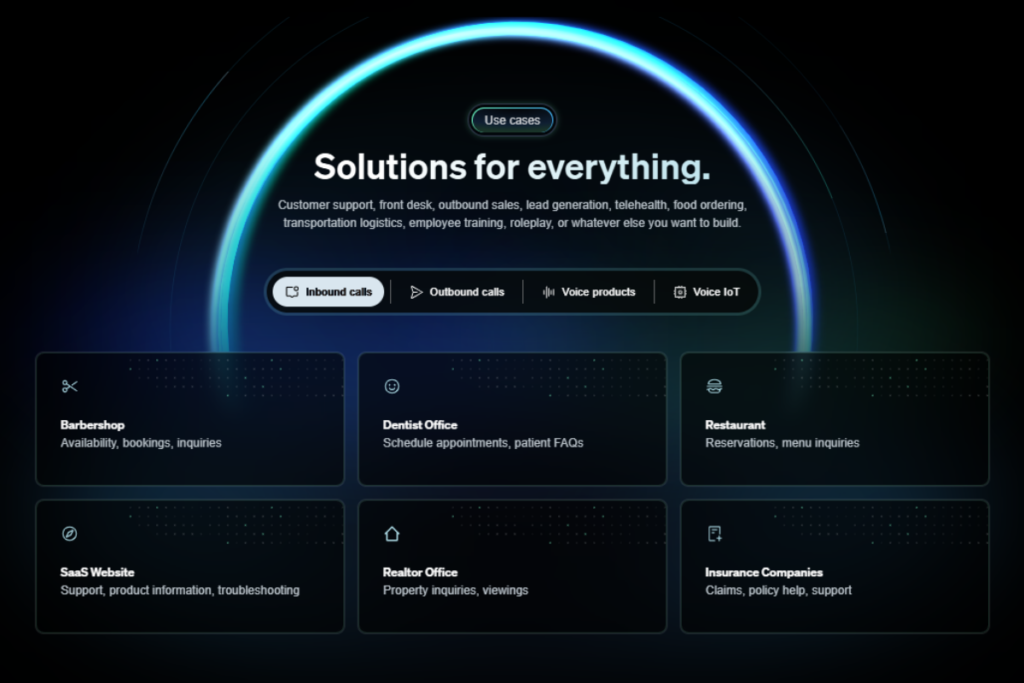
Vapi’s functionality and pricing make it a versatile solution for various industries. Here are the key scenarios where it proves most effective:
Customer Support Automation
Businesses looking to streamline their customer service can benefit greatly from Vapi’s automation capabilities. It handles routine inquiries efficiently, reducing the workload for human agents.
For example, retail businesses can manage product inquiries or order tracking with voice-based workflows, ensuring faster response times.
Healthcare Appointment Management
Healthcare providers often face scheduling challenges. Vapi enables automated appointment bookings, reminders, and cancellations, helping clinics and hospitals manage operations more effectively. Its multilingual support further ensures inclusivity for patients from diverse backgrounds.
High-Volume E-Commerce Needs
E-commerce businesses experience significant fluctuations in call volumes during sales events or holiday seasons.
Vapi’s infrastructure adapts to handle these surges, allowing enterprises to maintain service quality without disruptions. Integrations with CRM systems enhance customer interactions by syncing data seamlessly.
Financial Services
Financial institutions can use Vapi for secure communication, such as account updates or fraud notifications. Its natural language capabilities ensure accurate handling of customer inquiries, while compliance-friendly workflows make it a strong option for this sector.
Global Communication Requirements
Organizations serving international customers can utilize Vapi’s multi-language support to deliver consistent service. The availability of cost-effective phone numbers at $2 per month further simplifies global expansion efforts.
Limitations in Certain Scenarios
- Small Teams Without Technical Expertise: Custom setups may require technical resources, which could challenge smaller organizations.
- Budget-Sensitive Operations: Businesses with tight financial constraints may need to evaluate costs carefully to avoid unexpected expenses.
Vapi’s adaptability and extensive feature set make it an excellent tool for businesses seeking automation and scalability. However, the tool’s effectiveness and usefulness depend on the business’s specific needs and resources.
Vapi Support
Vapi balances its functionality with a user-focused design to help businesses and developers build voice AI solutions. Here’s an evaluation of its usability and customer support.
Ease of Use
The platform provides a clear and organized interface aimed at technical users. Developers familiar with APIs will find the platform intuitive and easy to work with. New users are welcomed with $10 in free credits, allowing them to test features and workflows without upfront costs.
The platform might pose some challenges for non-technical users. Its reliance on API configurations requires a basic understanding of technical processes, which could slow adoption for teams without dedicated IT resources.
Comprehensive guides and tutorials are available, but users with limited technical expertise may need additional assistance to utilize its features thoroughly.
Customer Support
Vapi provides various support options to cater to the needs of its users:
- 24/7 Enterprise Support: Businesses with an enterprise plan can access round-the-clock assistance, including direct communication through a Slack channel.
- Standard Support: Regular users can reach out through email or ticket-based systems, with responses typically prompt but prioritized for enterprise accounts.
- Resource Library: The platform offers detailed documentation, guides, and video tutorials that help users understand its features and optimize workflows.
- Engineering Support for Enterprise: Scheduled engineering consultations (2–3 times per week) offer personalized support to help organizations troubleshoot and refine their setups.
Overall Assessment
Vapi strongly caters to developers and organizations that need technical resources. Its support system is well-structured, so users are comfortable working with technical tools.
The combination of 24/7 assistance and direct engineering guidance for enterprise clients adds significant value, especially for those managing complex workflows. That said, users without a technical background might initially find the platform challenging to navigate.
Expanding onboarding and support options tailored to non-technical users would make Vapi accessible to a broader audience. Its support system is responsive and effective for those prepared to work with its technical framework.
Vapi Integrations
Vapi supports a wide range of integrations and is designed to work seamlessly with various tools, platforms, and devices. This compatibility makes it a practical solution for businesses seeking to optimize voice applications without disrupting existing processes.
Key Integration Capabilities
Vapi connects effectively with multiple platforms, including:
- CRMs: Integrates with systems such as Salesforce and HubSpot to streamline customer management by automatically logging interactions and syncing data.
- Telephony Systems: Works with existing telephony infrastructure, allowing businesses to implement voice solutions without major upgrades.
- APIs: Provides support for external APIs, enabling developers to incorporate specialized tools like advanced analytics or real-time language translation into their workflows.
- Custom Applications: Allows businesses to integrate proprietary software, ensuring smooth information flow between internal tools and voice workflows.
Workflow Benefits
By integrating with widely used platforms, Vapi simplifies tasks and improves efficiency. For example, connecting voice workflows with a CRM system ensures customer interactions are logged and updated automatically, reducing errors and saving time.
Its compatibility with telephony systems allows easy deployment without significant changes to existing setups. Developers can use API integrations to add unique features to their voice applications, such as real-time sentiment analysis or enhanced reporting capabilities, further improving functionality and operational outcomes.
Device and Operating System Compatibility
Vapi’s web-based platform and APIs are compatible with various devices and operating systems. They can be accessed via any standard web browser, ensuring they work well across different hardware and software environments.
The platform adapts to the user’s specific requirements, whether deployed on cloud-based or on-premises infrastructure. Vapi’s broad integration capabilities and device compatibility make it useful for all types of businesses.
Connecting with common platforms and offering implementation flexibility enable organizations to enhance their workflows and customer interactions without unnecessary complexity. This versatility ensures that Vapi can meet the diverse needs of its users.
Vapi FAQs
This FAQ concisely answers common questions about Vapi, helping users better understand its features and offerings.
1. What is Vapi’s pricing structure?
Vapi charges $0.05 per minute for calls, with additional at-cost fees for services like transcriptions. Phone numbers cost $2 per month, and new accounts include $10 in credits for testing.
2. Which platforms does Vapi integrate with?
Vapi integrates with CRMs like Salesforce and HubSpot, telephony systems, and external APIs, helping businesses streamline operations and optimize voice workflows.
3. What support options are available?
Vapi offers email- and ticket-based support to all users. Enterprise clients receive 24/7 assistance, direct engineering consultations, and access to a dedicated Slack channel.
4. Is Vapi easy for non-technical users to use?
The platform is developer-focused, which may require technical knowledge. While comprehensive resources are available, non-technical users might need extra support for setup and usage.
5. Does Vapi support multiple languages?
Yes, Vapi includes multi-language functionality, making it suitable for businesses that engage customers in different regions or languages.
6. Can Vapi handle high call volumes?
Vapi’s infrastructure is designed for scalability, making it effective for businesses managing large or fluctuating call volumes, such as during seasonal demand increases.
Vapi Alternatives
Below is a detailed comparison of Vapi and its competitors, focusing on features, pricing, and suitability for different business needs.
| Platform | Key Features | Pricing | Best Fit |
|---|---|---|---|
| Vapi | Customizable APIs, multi-language support, real-time testing, and integration with CRMs and telephony systems. | $0.05 per minute for calls; at-cost provider fees; $2/month per phone number; $10 free credits for testing. | Developers and businesses needing flexible voice workflows with scalable solutions. |
| Retell AI | Voice-enabled applications with real-time call management and simplified workflows. | Custom pricing based on usage and features. | Organizations requiring quick voice application deployment with minimal setup. |
| Vocode | Developer-friendly tools with APIs and prebuilt templates for creating voice interfaces. | Flexible pricing with a free trial option. | Teams looking for fast implementation and ready-to-use templates. |
| Hey Caden AI | AI-powered voice agents focusing on customer support and sentiment analysis. | Subscription-based plans with enterprise options. | Large-scale operations needing advanced customer service tools with insights. |
| Speechmatics | Speech-to-text transcription with high accuracy and multilingual capabilities. | Pay-as-you-go; custom plans for larger usage. | Businesses focusing on transcription and voice recognition rather than conversational AI. |
| Deepgram | Voice recognition and transcription with fast processing and customizable models. | Starts at $0.004 per second; enterprise pricing available. | Organizations prioritizing real-time transcription and adaptable voice AI models. |
| Telli | Voice automation solutions for contact centers, focusing on operational efficiency. | Usage-based pricing with a free trial available. | Call centers needing scalable solutions to improve operational workflows. |
| TalkStack AI | Voice-driven customer engagement tools with CRM integration capabilities. | Subscription pricing; specific details available upon request. | Medium-sized businesses integrating voice features with customer engagement platforms. |
| Goodcall AI | Call automation for lead generation and follow-up tasks. | Pricing varies by usage volume. | Sales teams focused on automating lead generation and follow-ups. |
| Regal AI Phone Agent | Voice AI designed for outbound customer interactions with high-touch workflows. | Enterprise pricing tailored to features and scale. | Companies managing outbound customer communication at scale. |
| RimeAI | Conversational AI for complex customer interactions with real-time adaptability. | Custom pricing based on usage needs. | Organizations seeking adaptable AI for diverse customer scenarios. |
Vapi offers a versatile platform for scalable, customizable voice workflows, making it ideal for businesses with technical teams and specific integration needs. Its competitors provide specialized features:
- Retell AI and Vocode suit businesses seeking quick setup and developer-friendly tools.
- Hey Caden AI and TalkStack AI cater to customer support and engagement-focused organizations.
- Speechmatics and Deepgram specialize in transcription and recognition, targeting accuracy-driven use cases.
- Goodcall AI and Regal AI Phone Agent excel in sales and outbound communication.
- Telli supports contact centers to streamline operations.
- RimeAI provides flexibility for handling complex conversational workflows.
Each platform offers unique benefits, so the choice is dependent on the business’s specific goals and technical resources.
Summary of Vapi
Vapi was founded in 2020 by Jordan Dearsley and Nikhil Gupta. Its headquarters are in San Francisco, California. The company focuses on voice AI, providing developers with tools to create, test, and deploy advanced voice agents.
It also offers customizable workflows and integrations with popular platforms like CRMs and telephony systems. In October 2024, Vapi secured $25.2 million in Series A funding. Investors include Bessemer Venture Partners, Y Combinator, and Abstract Ventures.
This funding has supported the platform’s growth and the expansion of its capabilities. Vapi is widely used across healthcare, finance, and e-commerce industries. Its platform handles high call volumes, supports multiple languages, and is known for its developer-friendly APIs.
The company has established itself as a significant player in voice AI, serving businesses with diverse needs and maintaining scalability. Vapi continues to evolve and expand its presence in the industry.
Conclusion
Vapi is a flexible voice AI platform that supports businesses and developers in creating and managing advanced voice solutions. Its strengths include customizable APIs, seamless integration with popular tools, and the ability to handle large-scale operations.
Multi-language support and real-time testing features make it particularly effective for healthcare, finance, and e-commerce industries. Some challenges include a learning curve for non-technical teams and the need for more transparent pricing structures for businesses with varying usage patterns.
These are considerations for users needing additional resources to utilize the platform fully. We recommend Vapi to organizations seeking a scalable voice AI solution that integrates smoothly with existing systems.
The $10 starter credit is an excellent opportunity for new users to explore the platform. Visit Vapi to learn more, start a trial, and share your experience to help others make informed decisions.